Here are the top 20 ways & tips to learn DIY Skills
With the emergence of various online platforms, DIY has become more popular. Who doesn't love to watch a good DIY before and after?
People are now empowered to be more creative and resourceful in pursuing their DIY skills. Learning new or improved DIY skills is not only fun, but also practical. You can save money, create something unique, and have a sense of satisfaction seeing your labor of love. You will remember the day you look at your first DIY project and say, “I made that!”
If you're interested in learning how to DIY skills, below are 20 tips to help you head in the right direction.
Learn About Beginner DIY Tools
Learn what power tools are best for beginners. Each power tool is very learnable, but if you err on the side of caution and have anxiety, using tools that are rated as beginner tools will help you ease into it a bit more safer.
Before starting any project, you want to have the right tools. There are many different approaches to DIY home projects and some tools can be used for tasks they weren't intended for. This goes against safety standards though and it's not recommended especially for a beginner. Try to stick to using each tool for how it was made to be used.
It's important to do some research on the tools you will need as a beginner, and to complete specific projects. Here are a few tools I've rated as beginner friendly – a miter saw or possibly a jigsaw for smaller DIY projects, a power drill, an orbital sander and brad nail gun. Also, it's important to know that with almost every DIY project, you are going to use a speed square and level.
There are other essential tools that you should have in your toolbox, and I talk more about that in my free diy for beginner's basics kick-starter guide.
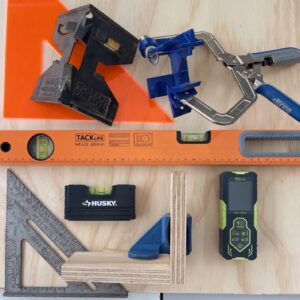
Watch Videos
There are numerous DIY videos available on different platforms. (YouTube, Instagram, Tiktok, Facebook) Find a few favorite DIY content creators you trust and would love to learn DIY skills from. Watching these videos will give you ideas and tips for starting DIY projects.
Unfortunately, some DIY steps can get left out of videos. So, you might have to watch a few different DIY project videos to get clear and detailed instructions on how to complete a task from start to finish.
Tackle the Basics
Starting with the DIY beginner basics allows you to gradually enhance your skills and confidence in DIY projects. Simple DIY projects such as painting your room, hanging curtains, building simple planters, adding shelves to a closet, convert a closet into a mudroom, simple accent walls in a kid's room are good examples of basic projects that you could learn DIY skills from.
I always suggest starting in a spare room, closet, kids room in case it isn't perfect the first time.
Finish Your Projects
It's soooo important that you complete your DIY projects. Make sure that you have enough time, focus, and resources to complete a project. Talk to your family about the timeline and helping with kids if needed. Schedule time in your calendar, and make sure you are well prepared. The sense of satisfaction you get from completing a project will give you the confidence to move forward with others.
Not to mention, you don't want to end up on the 95% club, because it starts to wreak havoc in your house and will eventually stress you out. Don't ask me how I know!!?!
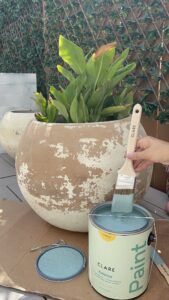
Start Small DIY Projects
I talked about some projects in the basics section, but I really wanted to emphasis SMALL. Starting on a smaller scale project than what you might normally do is great for DIY beginners. When you learn a new skill or hobby, it's essential to feel successful and encouraged. Some even small projects could be home decor upcycles, furniture flips, building a picture frame, or paint a color block accent wall.
Plan Plan Plan – Skills & Projects
Planning is crucial when it comes to learning DIY skills and doing projects. Before starting, take time to plan the project from start to finish. Identify the materials and tools you need; estimate the time the project will take and factor in any possible challenges. Sometimes this comes with experience, and you will get better with each project.
I will admit, I often start projects without a out plan. That works for me on occasion, so do what is best for you. If you are waiting because you don't have the perfectly thought out plan – then don't let that hold you back and just START somewhere.
Know What DIY PPE You Need
 Safety is a top priority when learning DIY skills and doing any DIY project. Make sure to wear protective gear such as safety glasses, ear protection, masks and possibly gloves to protect yourself from harm. At first it seems trivial, but it's so important to prevent any injuries. Over time saw dust and loud noises will have an adverse effect on your body. Remember, prevention is better than cure.
Safety is a top priority when learning DIY skills and doing any DIY project. Make sure to wear protective gear such as safety glasses, ear protection, masks and possibly gloves to protect yourself from harm. At first it seems trivial, but it's so important to prevent any injuries. Over time saw dust and loud noises will have an adverse effect on your body. Remember, prevention is better than cure.
Learn How to Measure Properly
Measuring correctly is essential and top on my list teaching my DIY beginner students. Accurate measurements ensure that your work is precise and of high quality. It prevents you from wasting time and money having to start over. Invest in a good tape measure, square and angle gauge.
Learn How to Cut Accurately
Cutting accurately is also essential when working with wood, metal, or any material. Know what tools are best for what cuts and types of material (sometimes types of wood as well). Practice your cutting skills and techniques before starting your project.
 Prepping the Material
Prepping the Material
Prepping your wood correctly is essential in any DIY project. Make sure to clean your materials, sand them down using the correct grit sequence, and remove any splinters or rough edges if needed. This will ensure that your work is neat and professional-looking. It's also essential for staining and painting.
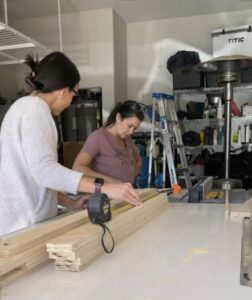 Take a Class or Course
Take a Class or Course
Taking a class or course is a great way to learn about DIY skills. There are numerous online and offline courses that you could take. Some community centers or home improvement stores even offer free classes and workshops on DIY projects. Find one that best fits your timeline and budget. Sometimes investing in yourself saves you time and money down the road. It equips you with the right knowledge and skills and can even boost your confidence and have a positive impact in helping you reach your goals quicker. Check out my DIY Kick Starter Course here.
Identify Your Interests
DIY projects are a broad category, and it's a good idea to identify what you like doing so you know the right DIY skills to learn. If you enjoy painting and decorating, focus on DIY projects related to interior design and home decor. You may not need as many tools going this route. It's also a great place to start to help you build up to more advanced DIY projects. If you want to build furniture or do cabinets or trim work, try focusing on DIY skills and projects that are more in line with woodworking and cabinetry.
Talk to Others You Know that DIY
Talking to people who are already doing ideas or who have already completed a DIY project can provide a wealth of knowledge. Ask for tips and techniques, learn from their mistakes. Learning a new skill is fun with friends anyway. You might even find a supportive community of DIYers who can encourage and inspire you.
Use High-Quality Materials
I agree this one is a little circumstantial to your situation and honestly the project. As a beginner, I don't recommend the investment until you have had a few projects under your belt. If the means are there, using high-quality materials on your DIY projects will make them more durable and long-lasting. Investing in quality materials may be more expensive, but sometimes it's worth the investment in the long run. Something to think about as you hone in on your skills and level up your DIY projects.
Practice Patience
Patience is essential in learning diy skills or any new skills. Some projects may take longer than expected, and it's important to be patient and focused throughout the process. Sometimes you have to work on projects in between life and kids. It can be frustrating because you are excited for the new project to be completed and see that pretty space done. Rushing through a project may lead to poor quality work, you skipping important steps or even injury.
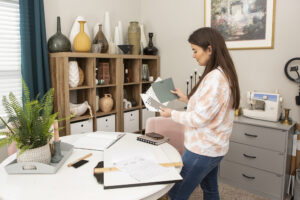
Get Creative (my favorite)
DIY projects are all about creativity and originality. I mean sometimes it's an exact dupe, ha! But, don't be afraid to experiment and come up with new ideas. I love trying to reuse things from around the house and making treasures from trash! Combine techniques and materials that may seem unconventional but work well together. Trust me, I have thrown out plenty of projects or home decor pieces that came out blotched from experimentation. Just have fun with it, and if you have friends or kids, get them involved.
Explore New Horizons
Challenge yourself by trying new DIY projects here and there, even if they are outside of your comfort zone. This will help you develop new skills, and who knows, you might find something else you really love to do!

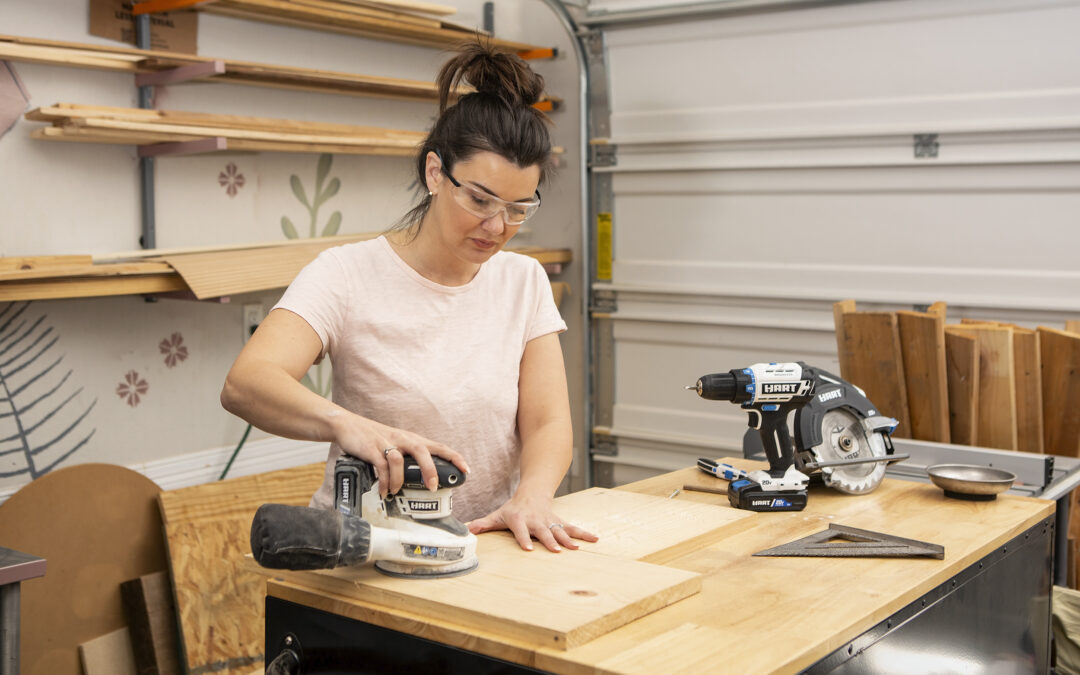

Trackbacks/Pingbacks